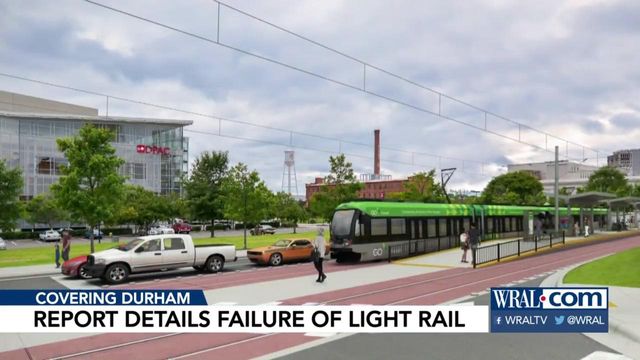New report critical of GoTriangle for failure of Durham light rail project
A new report by the the American Public Transportation Association is assigning blame for why a massive light rail project in Durham failed to gain traction.
Posted — UpdatedThis week, the American Public Transportation Association sent its findings to GoTriangle interim CEO Shelley Blake Curran, and the report is critical of the transit organization.
The APTA report found that risks were “well-known and understood from the beginning of the project,” yet the $2.5 billion project proceeded.
The report states that the project “underscores the risk of ‘kicking the can down the road’ when dealing with fundamental issues on which project implementation depends.”
Curran, who took over the position after the project failed, acknowledged the criticism, and said she believes the report is fair.
“I think that it’s a learning experience, and we just have to make sure that we’re looking at projects and critiquing them the way that we need to be,” Curran said.
The report also suggests that the project was not well-organized.
It says some business stakeholders “revealed skepticism that the (light rail) project could ever be successfully implemented,” noting, “there was a lack of project champions, particularly in the employer/business community.”
When asked if GoTriangle accepts responsibility for the project’s failure, Curran said no.
“I think that we realize that we played a part of a role in it,” she said, adding that a lack of cooperation from the state legislature, Duke University and the railroads played roles, too.
“I think we all had assurances that we did have a partnership there. And then, obviously, things changed. Maybe we should have realized a little bit sooner that things had changed,” she said.
To compile the report, APTA staff members interviewed project stakeholders, GoTriangle officials, and GoTriangle board members, including Wendy Jacobs, the chair of Durham County’s Board of Commissioners.
“I think what we’ve learned is that we need to do better risk analysis,” Jacobs said. “That’s definitely one of my takeaways.”
The report states that those interviewed believed a project of such magnitude “may not have been the best first project for the region.”
It notes that “many transit agencies start smaller – Charlotte’s initial Blue Line LRT cost less than $450 million.” It found that the failure of the light rail “eroded public confidence in GoTriangle.”
The report criticized the make-up of GoTriangle’s board, saying that its members are not able to provide “subject matter expertise,” and do not represent the diversity of the community.
In response to the finding, Curran said she has created an ad hoc committee to look at board structure.
In addition to its criticisms, the report offers recommendations. It found that the success of future GoTriangle projects depends on “realistic assessments and qualification of all significant risks,” stating that the “risks associated with buy-in from and agreement with both Duke University, other key stakeholders and the Railroads were well-known and understood from the beginning of the project.”
The report does have positive components, including praise for GoTriangle’s staff and board as having “passion for both public transportation and the mission of GoTriangle.”
“I think everybody really wants to take these recommendations seriously,” Jacobs said.
Asked how the public can trust GoTriangle with big projects moving forward, Curran said: “I’m an attorney. So, certainly, while I’m in this role, we are going to look at the risk as a huge piece of every assessment that we do…and I think when we have partners say that they’re supportive, we’re going to need a lot more reassurances this time around.”
Related Topics
• Credits
Copyright 2024 by Capitol Broadcasting Company. All rights reserved. This material may not be published, broadcast, rewritten or redistributed.






